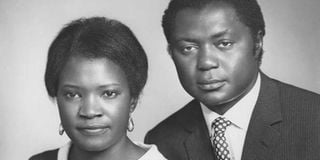Tom Mboya: The man Kenya has forgotten

Tom Mboya and Pamela Odede before they got married. PHOTO | AFRICA24MEDIA
What you need to know:
- On Tuesday, there was hardly any event to remember the man who was the second high-profile politician to be assassinated in post-independent Kenya.
- This perhaps confirms Mr Mboya’s biographer David Goldsworthy's fear, and which is the title of his book: The Man Kenya wanted to Forget.
Some 47 years after he became the second high-profile politician to be assassinated in post-independent Kenya, Tom Mboya’s name appears to be slowly fading away.
On Tuesday, on the anniversary of his death, there was hardly any national memorial or lectures in his honour – perhaps confirming Mr Mboya’s biographer David Goldsworthy's fear, and which is the title of his book: The Man Kenya wanted to Forget.
Mr Mboya, a minister for Economic Planning and Development, was only 38 when he was shot along Nairobi’s Moi Avenue (then Government Road) as he stepped out of a chemist, triggering a national uproar.
While fingers were pointed to Jomo Kenyatta’s inner circle wary of Mr Mboya’s rise within the succession matrix, the political link has remained elusive and none of the insiders was questioned or arrested.
Instead, the blame fell on a Bulgaria-trained activist Nahashon Njenga, the man later found guilty of pulling the trigger of the Smith-Wesson revolver.
Njenga, a graduate of High Military School V. Levsky in Bulgaria, had hidden the gun and ammunition in his Ofafa Jericho house inside a box. He had trained as a sapper.
It was during this search that Njenga is alleged to have attempted to bribe one of the police officers involved in the search saying: “Mundu witu tiga guthii muno (Our man, don’t go very far…)". And he stated: “If it is five thousand or ten thousand you want I will give you…”
The investigation led by Joginder Singh Sokhi took a new turn when he asked him: “Why pick on me, why not the big man?”
Neither Mr Njenga nor Mr Sokhi told the court who the “big man” was.
Born on August 15, 1931, Mr Mboya would have turned 85 next month.
Although he had trained as a sanitary inspector in Kabete, having grown in William McMillan’s sisal farm in Oldonyo Sabuk, he rose quickly as a labour leader and in 1962, aged 31, he was already Kenya’s minister for Labour.
Mr Mboya viciously fought politicians allied to Oginga Odinga, whom he had accused during pre-independence years of financing Kenya Office in Cairo – a socialist outfit funded by the Egyptian government and which was calling for Kenyatta’s release.
OFFICE'S AIM
Mr Mboya thought that the aim of the Kenya Office in Cairo was to undermine him and James Gichuru – the Kanu leader.
At one point, the lobby group wrote to Kenyatta and without naming names, they told him that “certain leading personalities” in Kanu had made a pact with the Colonial Secretary to keep him in jail.
But it was Mr Odinga who became the strongest voice for the release of Kenyatta without conditions.
For his part, Mr Mboya had decided to woo Walter Odede, the father of his fiancée, Pamela, to Kanu in his bid to water down Mr Odinga’s influence among the Luo.
At the national level, he was instrumental in organising the 1966 Limuru Conference that downgraded Mr Odinga’s position within Kanu (he was Kanu’s vice-president) forcing him to quit and form his own Kenya People’s Union.
It was also Mr Mboya who helped stop Mr Odinga’s Lumumba Institute – funded by Eastern Europe countries – by raising the matter in Parliament and asking the government to take it over.
The institute’s aim was to train Kanu leaders but Mr Mboya argued in Parliament that it was a scheme to undermine elected leaders.
As a minister he was the chief government spokesman, one of the main architects of African socialism and was one of the most eloquent pro-government politician.
By endearing to Kenyatta, he became a marked man by the inner circle. To his credit, It was Mr Mboya who helped design the Kenyan flag and was in the planning committee for Kenya’s independence. More than anyone else, the British and US government had more faith in him than any other personality in the Kenyatta government.
His critics always thought he was the Central Intelligence Agency man in the region while the communists had no time for him.




